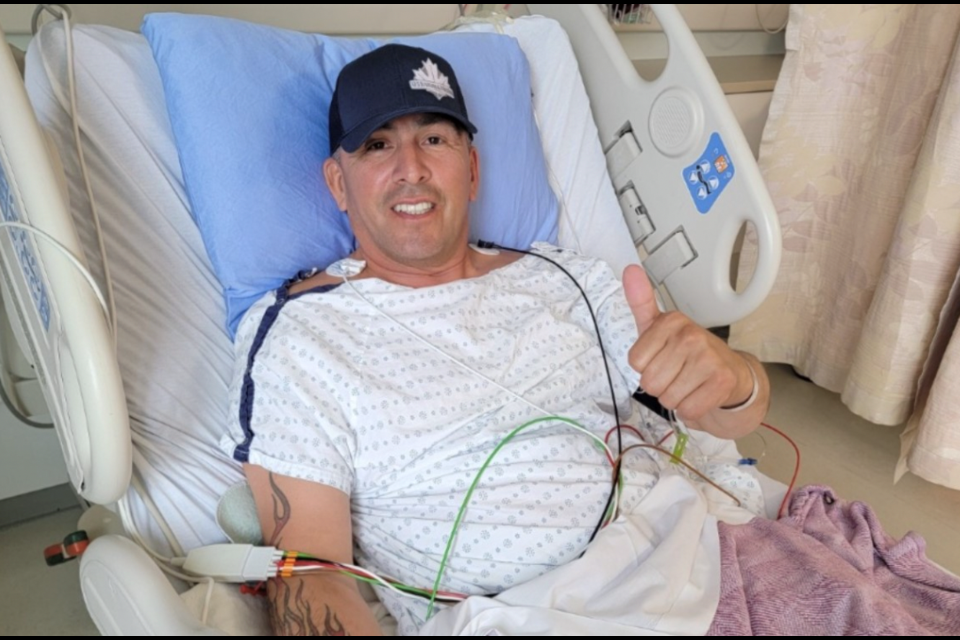This past summer, Fort McMurray resident David Bouchier was visiting the Lac La Biche County area when he experienced a life-changing cardiac arrest and heart attack. The otherwise healthy 56-year-old CEO of the Bouchier Group began having the onset symptoms on July 2 while visiting the Mystic Beach community, roughly 30 km north of the hamlet of Lac La Biche.
After profusely sweating and experiencing chest pains during the Canada Day long weekend, the situation turned dark.
“I sweat a lot when I work, but when I started pouring sweat without doing anything and just sitting there during breakfast, that’s when I realized something was not right with me. I started getting small pains in my chest,” but he assumed the signs were initially heartburn after the meal.
“Normally, I’m very stubborn and say ‘I’m fine’ but something told me this is very serious,” said Bouchier.
As the symptoms grew worse, his family and friends rushed him to the William J. Cadzow - Lac La Biche Healthcare Centre. After cardiac and blood assessments were completed by medical staff, it was identified that Bouchier had a “blockage of his coronary artery,” also known as STEMI (ST-segment elevation myocardial infarction).
“This can be one of the most serious types of heart attack,” according to Alberta Health Services (AHS).
Dr. Laurette Laubscher, and Registered Nurses Shayanne Gauthier and Nicole Yackimec were a part of the medical team on shift that was overseeing the emergency situation. Gauthier recalled the experience when the patient entered the emergency wing of the hospital recognizing the symptoms almost immediately, she said in a press release from AHS.
“When he told me he had been sweating over the last hour, I knew immediately this wasn’t good,” says Gauthier, noting that chest pain and profuse sweating are “textbook signs of a heart attack.”
Shortly after arriving at the hospital, the father of five went into cardiac arrest and the medical team spent 15 minutes bringing him back to life. The experience was frightening and it took Bouchier roughly 45 minutes to be able to communicate again.
Rural service
Bouchier credits his life-saving treatment to not only his family and friends that rushed him to the hosiptal, but to AHS and the medical team on hand.
“If it wasn’t for the local hospital, my family and friends, I wouldn't be here talking today. I wouldn’t have pulled through this.”
Residing in a rural northern community and considering that doctors, nurses and staff shortages have affected services throughout the province and country, Bouchier admits it was frightening to not know if he would get the care he needed in a remote community. But the minute he arrived, he felt he was in good hands.
“Coming from a remote community and out camping in the middle of nowhere in Lac La Biche and commuting to the local hospital for my heart condition, at the time was scary. But the service was amazing — the timing from the hospital and taking care of me as soon as I walked through the doors.”
After Bouchier was stabilized, he was transferred to Edmonton’s Royal Alexandra Hospital’s Cardiac Intensive Care Unit where he received a stent operation before being discharged a few days later.
Recovering
Just over three months after the medical emergency, Bouchier has been recovering and attending rehab to build up his strength.
“Ever since I got my stent procedure on Aug. 11, I’ve been doing really good. I’m back in the gym, I’m out doing my favourite thing in life — moose hunting.”
Bouchier is not only a business owner but also a councillor for his band in Fort McKay First Nations. He says he stepped down from his duties as councillor after the heart attack to focus on his health.
The 56-year-old says the situation has caused many challenges during recovery, both mentally and physically, but moving forward he hopes the situation will inspire people to take charge of their health and recognize the signs.
“Don’t say you’re ok because if something like this triggered, you can’t ignore it. I thought I was very healthy before, I watched what I ate, I’m not overweight… this could happen to anybody.”



